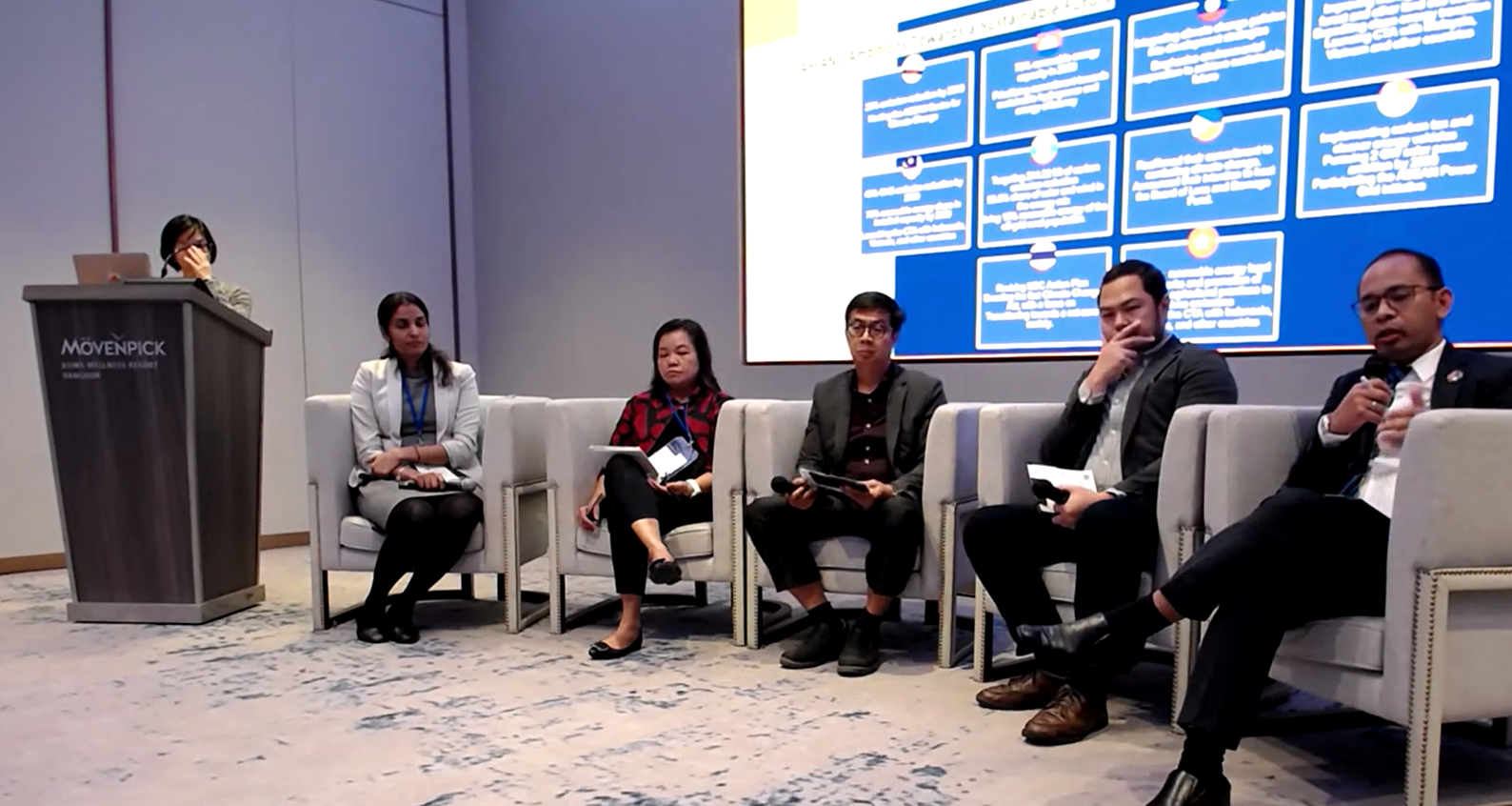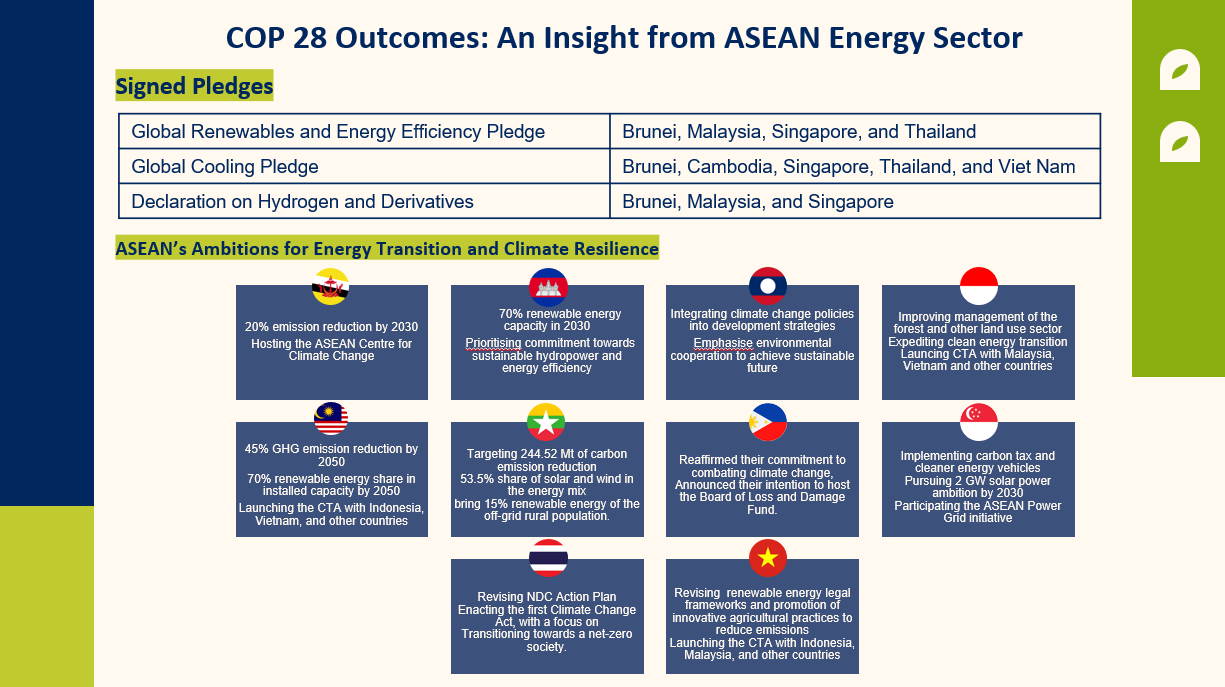i
i

Bangkok, 22 February 2024
The outcomes of COP 28, the United Nations Climate Change Conference, are set to have a significant influence on how the ASEAN region tackles climate change. It’s become clear that a thorough debriefing after COP 28 is crucial for understanding the priorities of ASEAN member states and how global climate policies can be tailored to meet the region’s unique needs. This understanding is key to leveraging international agreements to boost ASEAN’s climate initiatives and resilience.
On Thursday, 22nd February 2024 in Bangkok, Thailand, The Deutsche Gesellschaft für Internationale Zusammenarbeit (GIZ) hosted a deep-dive discussion titled “Debriefing Workshop of the 28th Session of the Conference of the Parties to the UNFCCC (COP28 UNFCCC)”. The workshop aimed to dissect the decisions and agreements made during COP28, with a keen focus on what they mean for ASEAN’s future. Moreover, by assessing the relevance of global climate policies to the specific needs of the region, the debriefing seeks to foster a comprehensive understanding of how ASEAN can leverage the results of global agreements to fortify its climate actions and resilience efforts.
The workshop was packed with five dynamic sessions, each shedding light on different facets of the COP28 outcomes, ASEAN’s reflections, sectoral insights, and the way forward to COP29. In this opportunity, Beni Suryadi, Manager of ACCEPT II took the stage to share insights on the latest developments from COP 28, specifically from the perspective of the energy sector.
In this opportunity, Mr Suryadi spotlighted several key pledges made by ASEAN Member States, such as the Global Renewable and Energy Efficiency Pledge, the Global Cooling Pledge, and the Declaration on Hydrogen and Derivatives. He painted a picture of ASEAN’s commitment to sustainable futures through each country’s efforts toward net-zero targets.

Beni further highlighted ASEAN’s commitment by sharing updates from each member state on their efforts to achieve carbon neutrality or net-zero emissions. These efforts span across a variety of areas, including hydropower, energy efficiency, carbon pricing, and policy reforms. He emphasized the essential roles of cross-sectoral collaboration and deep stakeholder engagement in fulfilling ASEAN’s energy commitments at both the regional and national levels. Additionally, Beni pointed out that the ASEAN Centre for Energy (ACE), through its ASEAN Climate Change and Energy Project (ACCEPT), is committed to enhancing the capabilities of ASEAN and its member states to transition towards a low-carbon economy. This initiative seeks to attain carbon neutrality or net-zero emissions in the upcoming years by leveraging capacity building, knowledge sharing, and collaborations among multiple stakeholders.
During his presentation, Beni highlighted the necessity for inputs from ASEAN Member States to provide valuable insights needed to support the drafting of the next cycle of the ASEAN Plan of Action for Energy Cooperation (APAEC), which concludes in 2025 and will usher in the next cycle covering the period from 2026 to 2030. The APAEC serves as a blueprint for energy cooperation within ASEAN. “We are initiating efforts to support APAEC and engage the energy and environmental sectors through the ACCEPT Project. The input from each ASEAN Member State is vital, particularly to incorporate considerations of net-zero emissions and climate change. Thus, we are seeking inputs from AMS to connect with the APAEC Drafting Committee (ADC) as a constructive way forward,” Beni shared.
This debriefing session illuminated ASEAN’s proactive stance on climate and energy challenges. The discussion of pledges, commitments, and actions underscored ASEAN’s escalating focus on climate action. Although the complexity of climate issues presents challenges, ACCEPT’s involvement in this debriefing not only showcased ASEAN’s strategic intentions for the energy sector but also highlighted the necessity for collective action through active collaboration. ACCEPT II is currently undertaking national net-zero studies through energy modelling to enable countries to progress towards net zero.
Moving forward, ASEAN needs to strengthen its commitment and efforts in each critical sector that contributes to high carbon emissions. The region also needs to maintain partnerships with multilevel stakeholders and community to scale up strategic capacity building to meet the goals of Paris Agreement within the ASEAN Member States.
Written by Keisha Aurel Christian and Indira Pradnyaswari
Join our ASEAN Researchers Network on Climate Change (ARNECC) by registering yourself here. Become a part of our collaborative efforts to address pressing climate challenges and shape a sustainable future.
Detailed information on ACCEPT II can be found at https://accept.aseanenergy.org/
We welcome any future collaboration, please feel free to contact us at [email protected]